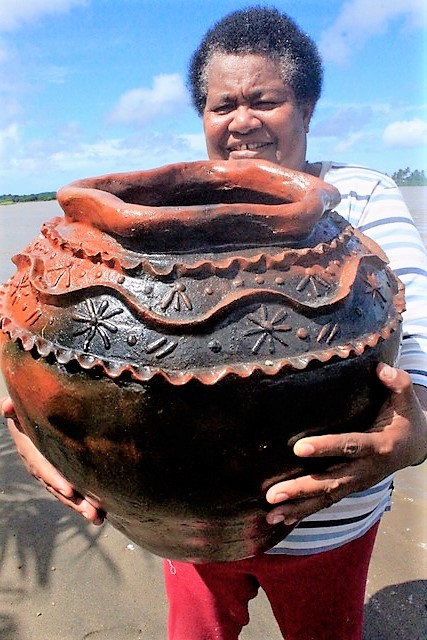Back in the day, there’s a special type of pot, a girl from Nasilai in Rewa Province must make to become a woman. It’s called the kuro ni Viti.
Salote Rokoca watched her mother make them, giving away tips to the observant child. The special, clayish sandy soil she must use right up to baking the pot. Every bit of knowledge the child stored. A gift from mother to daughter for her journey into womanhood. A ritual carried down generations through the matrilineal line. A way of life, a system of identity that is as crucial to the wellbeing of an iTaukei child as classroom education. Rokoca said that because of her art, she knows where she is from. Her role in her community and the responsibilities she must carry.
Making the pot is a spiritual experience. It requires a certain state of mind and heart. Not the urgency of meeting a deadline. Or a quota. And even though she sells them, the making of the pots, remains a ritual.
‘I mustn’t make pots when my heart’s not in it,’ said Salote.
‘The mana of my ancestors flows through my hands as I knead the soil and mould it into a pot.
‘I’m at peace, feeling the soil in my hands, watching it change,’ she added.
Her chants drew the children into the kitchen where she potted. She didn’t mind them. Sometimes, didn’t even notice them there and continued chanting. Beads of sweat clung to her brows. Her face glistened and glowed with invisible energy.
Her nimble fingers coaxed the dirt into a Moirua or saqa ni wai or a water storage container. Hung outside the chief’s home, the shape of the Moirua informed the villagers of the sex of the child. Every kind of pot has a story, preserved like the skill and soil, through potting.
The process of moulding, baking, sunning, drying and varnishing takes a month. There is no rush to meet numbers. Rather, the focus is always the experience and reverence for nature. In adhering to this, Salote protects her soil resource. Ensuring there is abundant left for the next pots. Keeping a potting tradition and its related stories alive through generations.
But there is a different force she must contend with. Climate change. Frequent floods and dredging of the Rewa River have gouged out the river banks near her home where she gets her soil.
But in recent decades, an enemy has emerged. Extreme floods, symptomatic of climate change, again and again, gouge river banks. Rokoca believes river dredging is another. She finds it harder to get soil.
‘The way it is going I am afraid one day I will make my last pot’ she added.
‘What gift will I give my daughter then? If this disappears, how do I call myself a woman from this tribe? This has been my identity for so long. I will disappear as a ‘dau tuli kuro’. What do I exist as?’
Rokoca doesn’t want to be a dying breed or to be one of the last of the potters!
Meli Tokalau of Nukulau Village, in Nasau, Ra is a herbal medicine specialist. These days, it takes him three horses to trek deep into the mountains to find healing plants.
Wakatu Fiji reports Tokalau usually found these plants close to home. Before the chainsaws, the graders and loggers came and destroyed forests.
Across the ocean, on the banks of the Dreketi River, young boys of Nabavatu rarely if ever go out on a wild pig hunt these days. A boy, must hunt a pig and carry it back to the village in a show of strength and courage. A rite of passage into manhood. Logging cleared the forests and destroyed wild pigs breeding grounds. Gone with the boars, is the forest choir. Of the Vaga, the Kula and the Kikau. Birds, that serenade the hillside where the village perches.
Over the years, villagers reclothed the forest with trees. An attempt to bring back the birds. To save water sources. To gift village boys with defining moments a rite of passage can give. To hold on to identity and wellbeing that is one with the ocean, the land, the sky.
The Reweaving the Ecological Mat Framework finds such wellbeing for most Pacific peoples is ‘difficult to imagine apart from their close interconnectedness to the land, sea and sky.
The Framework is a key outcome of the Reweaving the Ecological Mat initiative. It promotes a Pacific household founded on three pillars: spirituality, culture and economics. A household that needs to be rebuilt. It identifies the current capitalist development model of profit as destructive. To the environment and the Pacific person’s wellbeing. Rokoca, the potter’s wellbeing. Wellbeing that is only possible with having potting soil. Tokalau’s healing plants. And a mountain villages forest choir and hunting tradition.
Artistic expressions of this wellbeing can be seen at the Void: Voices in the Deep Art Exhibition and Auction to be held at the Holiday Inn, Suva on October 30.
n The Reweaving the Ecological Mat Initiative is coordinated by the Institute for Mission and Research of the Pacific Theological College. Theresa Fox is the communications officer for the Pacific Theological College



